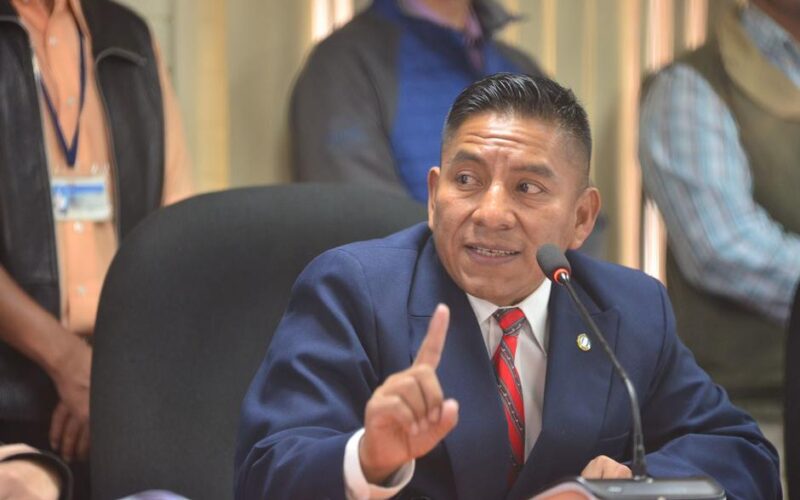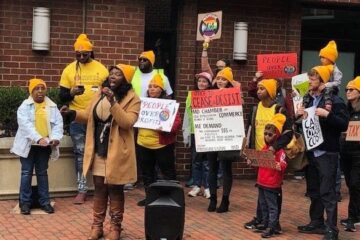Judge Pablo Xitumul. Foto: soy502.com
On October 6, the Supreme Court of Justice ruled to move forward with preliminary proceedings against Judge Pablo Xitumul of High Risk Court D regarding a traffic violation charge.
In 2019, a police officer stopped Xitumul in front of his home and demanded to search his car. When Xitumul refused, a struggle ensued. Both Xitumul and the officer filed complaints to the Public Ministry for abuse of authority; the Public Ministry threw out Xitumul’s complaint and only pursued the one against him.
After this week’s ruling, he faces losing his immunity and being open to this charge and more than 30 others filed against him by opponents. According to Xitumul, this is the latest attack against independent judges in Guatemala, stating, “It’s revenge and a message for the High-Risk judges for being objective, impartial and independent.”
In his tenure as President of High Risk Court D, Xitumul ruled on several notable cases, including the genocide case against former president Efraín Ríos Montt. Ríos Montt was sentenced to 8o years in prison in 2013, but the court’s decision was overturned just months later.
Guatemala’s Observatory for Judicial Independence issued a statement denouncing the case against Xitumul as “malicious” stating, “The Supreme Court of Justice has the responsibility to protect the independent exercise of the high-impact judges, watching out so they aren’t victims of spurious persecutions that only seek to undermine the fight against impunity and corruption.” Xitumul is also a recipient of precautionary measures through the Inter-American Commission on Human Rights (IACHR). According to the Guatemalan Association of Judges for Integrity, «The State of Guatemala has the duty to act to protect the judicial independence and integral security of said judicial officials.»
Constitutional Court Rules to Open Pretrial Proceedings Against Judge Erika Aifán
The Constitutional Court (CC) ratified its decision on October 4 to reactivate the preliminary trial against Judge Erika Aifán. The court declared the appeal she made for clarification and extension on September 19 inadmissible. The legal process against Aifán began in 2020 when the Institute of Magistrates of the Appeals Chambers of the Judicial Branch filed a complaint claiming that she authorized an «illegal» investigation of magistrates implicated in the «Parallel Commissions 2020» influence-peddling case. This week’s decision will now be sent to the Supreme Court, where the pretrial process–which determines the fate of her judicial immunity–can begin.
Aifán condemned the ruling, claiming it is a move to intimidate her by opening criminal proceedings that could possibly lead to her imprisonment. She also argued that it violates her right to judicial independence. The Guatemalan Association of Judges for Integrity issued a statement calling for “objectivity, transparency, and strict compliance with guarantees of due process” for the pretrial proceedings against both Aifán and Judge Pablo Xitumul. The group also urged citizens to demand judicial independence “as a right of citizens and as a guarantee of the democratic and constitutional rule of law to have independent and impartial courts.”
IACHR Passes Resolution to Protect FECI Special Prosecutors
The Inter-American Commission on Human Rights (IACHR) on October 7 granted precautionary measures to two special prosecutors in the Special Prosecutor’s Office Against Impunity (FECI). The IACHR cited risks to the individuals’ rights to life, personal integrity, and independence given their positions as investigators on high profile cases involving extrajudicial killing. The Valenzuela Ávila and Ruiz Fuentes cases are tied to operation «Plan Gavilán,» in which the IACHR has already found the State of Guatemala responsible for human rights violations.
The resolution references the arbitrary removal of head prosecutor Juan Francisco Sandoval from the FECI in July, in addition to the “context of adverse risk to the work of the FECI, as well as attacks and threats against justice operators in attempts to advance in the fight against impunity and corruption.” The IACHR calls upon the State of Guatemala to ensure the protection of the rights of these special prosecutors. The state has until December 13, 2021 to prove their compliance with the latest resolution.

Police Intimidate Resistance to Illegal Mine Fénix, in El Estor, Izabal
In the early morning of October 6, hundreds of Guatemalan National Civil Police (PNC) arrived in the community of Chinebal, El Estor intending to evict 94 Maya Q’eqchi’ families from their ancestral land. The PNC contingent–of which several were identified as carrying high-caliber weapons by eyewitnesses–threatened to use force against the community if they did not vacate the land within an hour. According to the legal representative of the PNC present at the eviction,“You do not want to leave peacefully, so we are ordered to remove you by force.” After a standoff between the PNC and the community, the eviction was suspended.
Just two days before, the legitimate Indigenous Authorities had decided to organize peaceful resistance to a nickel mine threatening their homes, their way of life, and the environment. The Fénix Mine–owned by the Guatemalan Nickel Company which is a subsidiary of the Russian company Solway–has been a contested project in the Izabal region of Guatemala for illegal exploitation since 2005. Surrounding and affected communities oppose the project because the Ministry of Energy and Mines (MEM) did not obtain free, prior, and informed consent from the impacted Indigenous communities as required by national and international law.
In 2019, the Constitutional Court ruled, ratifying the right to consultation on the project as established in ILO 169. The CC resolved that the mining company had to suspend its mining activity in the meantime. On September 27, The Ancestral Council of Maya Q’eqchi’ Authorities filed an appeal against Minister Alberto Pimental–head of MEM–for his management and bad faith in the pre-consultation process.
To carry out their plan for peaceful resistance, the community on October 4 established a permanent encampment in the exit of El Estor, near the Rio Dulce, to prevent the passage of mining machinery. According to a participant at the encampment, “We are here to enforce the sentence that suspended the mining activities.” Many members of the Chinebal community were in the encampment when the police arrived with an eviction order against them, forcing them to abandon the encampment and move to defend their community.
We urge the authorities to respect the right to resistance and to attend to the demands of the Q’eqchi’ people.
Police Harass Family of Former FECI Head Sandoval
On the night of September 25, National Civil Police arrived at the home of the elderly parents of Juan Francisco Sandovoal, who fled to the U.S. in July in fear for his life following his arbitrary removal as head of the Special Prosecutor’s Office Against Impunity (FECI).
Supposedly following up on a warrant for his arrest, the police asked if the parents knew where Sandoval was. The Public Ministry had released the warrant on September 3, however, and according to a tweet from Sandoval, “The Attorney General knows, and has complained that I am in the United States.” Human Rights Ombudsman Jordán Rodas denounced what he called blatant harassment by the police. According to Rodas, these types of actions are «unnecessary, meaningless and lend themselves to interpreting that there is an intention of intimidation.”
Pandora Papers Rank Guatemala in Top 10 for Offshore Account Holders
Guatemala ranked #10 in the world for individuals using offshore accounts, according to the Pandora Papers. A leak of more than 11.9 million documents–analyzed by more than 600 journalists from 150 media outlets–revealed how the world’s richest people are using offshore accounts to store their wealth. The papers found that 658 Guatemalans appear to be benefitting from the use of this type of network. Notable individuals from the leak include Rudel Álvarez–former governor of Petén during the UNE government–and Federico Kong Vielman. According to documents, a month before leaving his post as governor, Alvarez created a trust that owns 99% of the shares in a hotel in Belize.
PNC Arrests Lawyer Known for Filing False Charges Against Opponents
Guatemalan National Civil Police (PNC) arrested lawyer Otto Gómez on September 28. The Prosecutor’s Office Against Organized Crime carried out an operation on September 24 to detain Gómez for the crimes of obstruction of criminal proceedings, psychological violence against women, sexual aggression, and ongoing discrimination and threats.
Gómez made criminal complaints against journalists, activists, and judges, including Judge Erika Aifán and Human Rights Ombudsman Jordán Rodas. According to the Prosecutor’s office, Gómez presented a series of illegitimate legal requests –not based on evidence–as part of a systematic effort to obstruct justice and procure impunity. The Public Ministry’s accusation indicated that Gómez coerced and threatened government officials in reprisal for making decisions that did not conform with his interests.
Donating online using your credit or debit card is one of the easiest ways to give securely. You can make a one-time donation or make a recurring gift. Monthly Sustainers are greatly appreciated as they are a key source of stability and allow GHRC to depend on a consistent monthly income year-round to support our work.
To donate to the Alice Zachmann Defenders Fund: CLICK HERE
To donate to GHRC’s work, wherever we most need support: CLICK HERE




